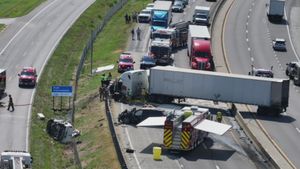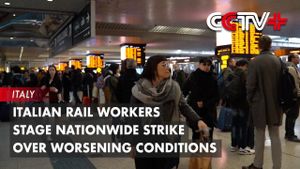MADRID - The morning commute for many travelers was disrupted on Tuesday as the service on Madrid's Metro Line 6 faced significant interruptions. This disruption, caused by a reported health emergency, resulted in commuters waiting at platforms and led to considerable inconveniences across the line.
According to reports, the Metro service was halted between the Moncloa and Plaza Elíptica stations, leaving thousands of travelers stranded. An emergency medical situation necessitated the quick response of health teams before services could resume.
Individuals aboard the metro experienced delays, with estimates indicating the resolution of the situation would take over one hour. Specifically, the words from one Metro spokesperson indicated, "The circulation has been interrupted on this suburban line due to health assistance," highlighting the urgency of the issue.
Despite the initial chaos, the situation was resolved more quickly than anticipated. Shortly thereafter, normal services were restored, allowing commuters to continue their travels. An announcement from Metro Madrid noted, "It has already been reestablished," signaling the end of the service disruption.
The swift recovery served as reassurance for those relying on public transit, especially during peak morning hours. Since Metro Madrid is one of the most heavily trafficked systems, any disruption can lead to significant ripple effects across the transportation network.
While the day may have begun with uncertainty, the restoration of services hinted at the efficiency of emergency protocols implemented by Metro Madrid. Further investigation will likely be conducted to ascertain the specifics around the health incident—a necessary precaution to avoid similar occurrences.
Travelers should remain aware of potential disruptions and understand the importance of health safety protocols, which can sometimes necessitate temporary service interruptions. The incident serves as a reminder of the unpredictable challenges urban infrastructures face and the need for effective communication during emergencies.
Technical issues aside, public transport systems must continue to adapt and uphold safety. With dense populations depending on Metro services for daily commutes, even brief interruptions can shape the entire transit experience. Stakeholders will be grateful for the quick action taken to alleviate the burden caused by this health emergency.
Those who traveled on Line 6 should also reflect on the delays as part of the shared experience of city living, where responsiveness and resilience are tested daily.
Moving forward, adapting to emergencies and ensuring operational integrity within public transit will remain at the forefront of urban planning. The expectation for seamless service clashes continuously with the realities of emergencies, but efficient responses can make all the difference.



